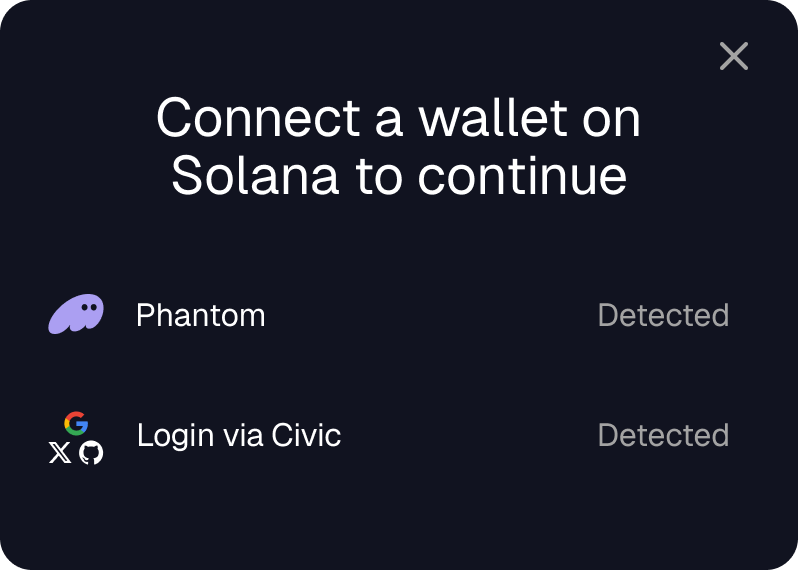Early AccessThe Civic Auth Solana API is subject to change as we continue to develop and refine our solution.
Creating a Wallet
When a new user logs in, they do not yet have a Web3 wallet by default. You can create a wallet for them by calling the createWallet function on the user object.
Currently, we don’t support connecting users’ existing self-custodial wallets. This is coming soon.Right now, we only support embedded wallets, which are generated on behalf of the user by our non-custodial wallet partner. Neither Civic nor your app ever has access to the wallets’ private keys.
Complete examples can be found on Github: import { userHasWallet } from "@civic/auth-web3";
import { useUser } from "@civic/auth-web3/react";
export const afterLogin = async () => {
const userContext = await useUser();
if (userContext.user && !userHasWallet(userContext)) {
await userContext.createWallet();
}
};
The useUser hook and UserContext Object
The useUser hook returns a user context object that provides access to the base library’s user object in the ‘user’ field, and adds some Web3 specific fields. The returned object has different types depending on these cases:
If the user has a wallet,
type ExistingWeb3UserContext = UserContext & {
solana: {
address: string // the base58 public key of the embedded wallet
wallet: Wallet // a Solana Wallet object
}
}
type NewWeb3UserContext = UserContext & {
createWallet: () => Promise<void>;
walletCreationInProgress: boolean;
}
userHasWallet type guard.
if (userHasWallet(userContext)) {
user.solana.wallet; // user has a wallet
} else {
user.createWallet();// user does not have a wallet
}
Using the Wallet
Sending a transaction
const connection = new Connection(/* your rpc endpoint */);
const { publicKey, sendTransaction } = user.solana.wallet;
const transaction = new Transaction().add(
SystemProgram.transfer({
fromPubkey: publicKey,
toPubkey: new PublicKey(recipient),
lamports: 1000000,
})
);
const signature = await sendTransaction(transaction, connection);
Checking the balance
const connection = new Connection(/* your rpc endpoint */);
const { publicKey } = user.solana.wallet;
const balance = await connection.getBalance(publicKey);
Signing a message
const { signMessage } = user.solana.wallet;
// The message to sign
const message = "Hello, World!";
// Convert message to bytes
const messageBytes = new TextEncoder().encode(message);
// Sign the message
const signature = await signMessage(messageBytes);
Using the Wallet with the Solana Wallet Adapter
The Civic Auth Web3 SDK uses the Solana Wallet Adapter to expose the embedded wallet to React frontends. This allows you to use familiar hooks such as useWallet and useConnection to interact with the wallet.
This means that Civic will be available as a choice for your users to connect when using @solana/wallet-adapter-react:
In the example above, the user has Phantom installed and can connect their existing Phantom wallets to your dApp via the wallet-adapter. These wallets cannot currently be linked to Civic Auth. When the user selects Civic Auth, they are taken through a social login flow which gives them an embedded wallet generated by our backend, which is then exposed to your dApp via the wallet-adapter interface.
The Civic embedded wallets cannot be connected at the same time as the user’s existing wallets.
Use with Webpack in NextJSWhen using the Solana Wallet Adapter with Webpack (default in NextJS <15.3), add the following flag in your next.config.ts or next.config.mjs file, passed into the createCIvicAuthPlugin function:createCivicAuthPlugin({
clientId: '<your civic auth client ID>',
// ensures Civic's Wallet Adapter integration works with Webpack:
enableSolanaWalletAdapter: true,
});
export const Providers: FC = () => {
const endpoint = "YOUR RPC ENDPOINT";
return (
<ConnectionProvider endpoint={endpoint}>
<WalletProvider wallets={[]} autoConnect>
<WalletModalProvider>
<CivicAuthProvider clientId="YOUR CLIENT ID">
<WalletMultiButton />
{ /* Your app's components go here */ }
</CivicAuthProvider>
</WalletModalProvider>
</WalletProvider>
</ConnectionProvider>
);
};
The above shows a minimal React example. Follow the integration steps to set up the CivicAuthProvider according to your framework. A Full Example
See below for a full minimal example of a Solana Adapter app using Civic Auth for an embedded wallet.
import { ConnectionProvider, WalletProvider, useWallet, useConnection } from "@solana/wallet-adapter-react";
import { WalletModalProvider} from "@solana/wallet-adapter-react-ui";
import { CivicAuthProvider } from "@civic/auth-web3/react";
// Wrap the content with the necessary providers to give access to hooks: solana wallet adapter & civic auth provider
const App = () => {
const endpoint = "YOUR RPC ENDPOINT";
return (
<ConnectionProvider endpoint={endpoint}>
<WalletProvider wallets={[]} autoConnect>
<WalletModalProvider>
<CivicAuthProvider clientId="YOUR CLIENT ID">
<WalletMultiButton />
<AppContent/>
</CivicAuthProvider>
</WalletModalProvider>
</WalletProvider>
</ConnectionProvider>
);
};
// A simple hook to get the wallet's balance in lamports
const useBalance = () => {
const [balance, setBalance] = useState<number>();
// The Solana Wallet Adapter hooks
const { connection } = useConnection();
const { publicKey } = useWallet();
if (publicKey) {
connection.getBalance(publicKey).then(setBalance);
}
return balance;
};
// Separate component for the app content that needs access to hooks
const AppContent = () => {
// Get the Solana wallet balance
const balance = useBalance();
// Get the Solana address
const { publicKey } = useWallet();
return (
<>
{publicKey && (
<div>
<p>Wallet address: {publicKey.toString()}</p>
<p>Balance: {balance ? `${balance / 1e9} SOL` : "Loading..."}</p>
</div>
)}
</>
);
};
export default App;


